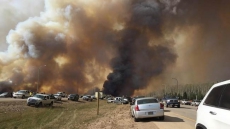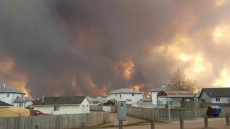Environmentalists are angry that a Russian rocket stage potentially carrying highly toxic chemicals is expected to splash down this weekend in a biodiversity hotspot in the Canadian Arctic.
"The idea of dropping a missile full of toxic chemicals in the Arctic waters off Baffin Island is just as preposterous as drilling for oil there," Greenpeace Arctic campaigner Alex Speers-Roesch said Tuesday.
"Dumping these chemicals from a ship would be a clear violation of international and Canadian law, and it is no more acceptable when it is dumped from the air."
A spokesman from the Canadian government was not immediately available.
An international aviation authority has issued a notice warning that debris from a Russian rocket launch is slated to fall Saturday into Baffin Bay. That's outside Canada's territorial waters but inside an economic zone the country partially controls.
The space debris is a stage from a rocket set off under Russia's Rokot program, a for-profit service that launches commercial satellites, said Michael Byers, a professor of international law and an Arctic expert at the University of British Columbia.
Byers said Russia is following the rules by informing aviation authorities of the launch and the splashdown. The stage is falling over a remote stretch of water between Greenland and the southern tip of Ellesmere Island.
He notes Rokot uses repurposed Cold-War-era intercontinental ballistic missiles to launch satellites. Those missiles, the SS-19, use hydrazine for fuel.
Hydrazine is known to be extremely toxic — so toxic that technicians working with it have to use pressurized hazmat suits, Byers said.
"The United States has very deliberately moved away from it because of the health and environment risk."
The U.S. last used hydrazine as a launch propellant in its Titan missile program which ended a decade ago.
The rocket stage is expected to come down in what is called the North Water Polynya, an 85,000-square-kilometre area of Arctic sea that naturally remains ice free year round.
The open water is a refuge for narwhal, beluga, walrus and bowhead whales. Its plankton-rich waters draw shoals of Arctic cod, providing food for an ecosystem that also supports seals, polar bears and millions of seabirds.
The polynya — the largest in the Arctic — is hunted by Inuit from Canada and Greenland. It's also connected through ocean currents to Lancaster Sound, where the Canadian government is considering creation of a marine protected area.
Byers said little is known about how hydrazine reacts in water, especially when it is cold and ice-choked. Nor is there any information on how much unused hydrazine the rocket stage is likely to hit the water with.
An American rocket stage that came down off the coast of Newfoundland in 2005 released more than two tonnes of a hydrazine-based fuel.


